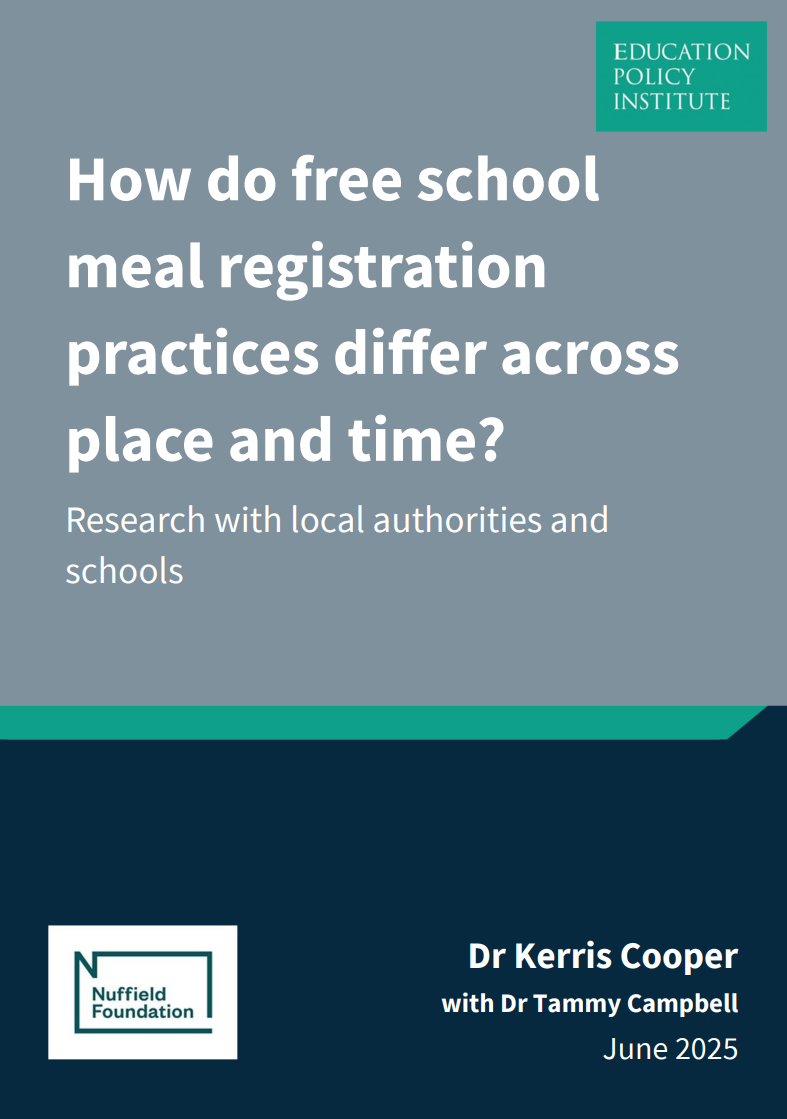A new report by the Education Policy Institute (EPI), funded by The Nuffield Foundation, shows significant variation in how free school meals (FSM) and free early years meals (FEYM) are accessed across schools and local authorities in England. This means there are differences in who is identified as ‘disadvantaged’ and therefore who accesses free school meals and other associated benefits to which they are entitled.
The report calls on the government to eliminate these inequalities by introducing a national auto-enrolment scheme, meaning that all eligible families would automatically be registered by the government for FSM (unless they opt out). This would build on last week’s positive announcement that the government will expand entitlement to FSM for all children in households on Universal Credit: boosting support to those in genuine need.
The report finds that:
- Where a child lives or goes to school determines how easy or hard it is to register for FSM – Depending on which school and local authority (LA) a child is in, different requirements are put on parents to register. For example, in some LAs parents are required to make their own application while facing significant barriers (described below) and if found ineligible at the time must reapply when circumstances change; other LAs collect information for all parents and periodically check eligibility for those not already registered so they can be signed up as soon as they become entitled. These differences in registration practices are important because they are likely to lead to inequalities in accessing FSM.
- Children under 5 are missing out – Some nursery children do not have access to the free meals to which they are entitled. Children who meet the FSM eligibility criteria and attend maintained nursery settings before and after lunch are entitled to free meals. However, some LAs interpreted this policy as optional rather than a statutory obligation and some were not aware of the policy at all. Furthermore, this entitlement only covers children in maintained nurseries, not those with childminders or in private, voluntary or independent settings, which is where the majority of children attend.
- Similarly, vulnerable families, including those for whom English is an additional language and those with ‘No Recourse to Public Funds’, for example, asylum seeking families, face multiple barriers in registering for FSM – Despite increased efforts to maximise registration, issues around language barriers, knowledge and understanding, and digital access are preventing the FSM benefits reaching children that need them. LAs have described how stigma also continues to prevent families from applying for the FSM to which they are entitled.
- The most inclusive approach is in LAs that are using local auto-enrolment to proactively identify entitled children without relying on parents sharing details or making an application. Where local auto-enrolment has been implemented by the LA, some have discovered large numbers of previously unregistered children.
The government must use the opportunity of the Children’s Wellbeing & Schools Bill to create new legislation that enables an auto-enrolment system for families, including for FEYM, ensuring they have access to the support they are entitled to. The report recommends:
- Introducing a national system of auto-enrolment – This would address many of the barriers to FSM and FEYM registration and reduce the inequalities in access to free meals and additional benefits. A national auto-enrolment system would significantly reduce the time and resources required by local authorities and schools to promote FSMs and maximise registration.
- Clarifying the free early years meals policy and supporting nurseries to provide it for all children who meet FSM eligibility criteria – There needs to be clarity for LAs that this is an obligation rather than optional, and the government should provide funding for settings to provide the meals. Otherwise, the associated increase in children eligible for FEYM will add more financial pressure to the already challenging situation pre-school settings are operating within.
You can download and read the full report here:
This report is kindly funded by The Nuffield Foundation.

The Nuffield Foundation is an independent charitable trust with a mission to advance social well-being. It funds research that informs social policy, primarily in Education, Welfare, and Justice. The Nuffield Foundation is the founder and co-founder of the Nuffield Council on Bioethics, the Ada Lovelace Institute and the Nuffield Family Justice Observatory. The Foundation has funded this project, but the views expressed are those of the authors and not necessarily the Foundation. You can read more about their work here.

